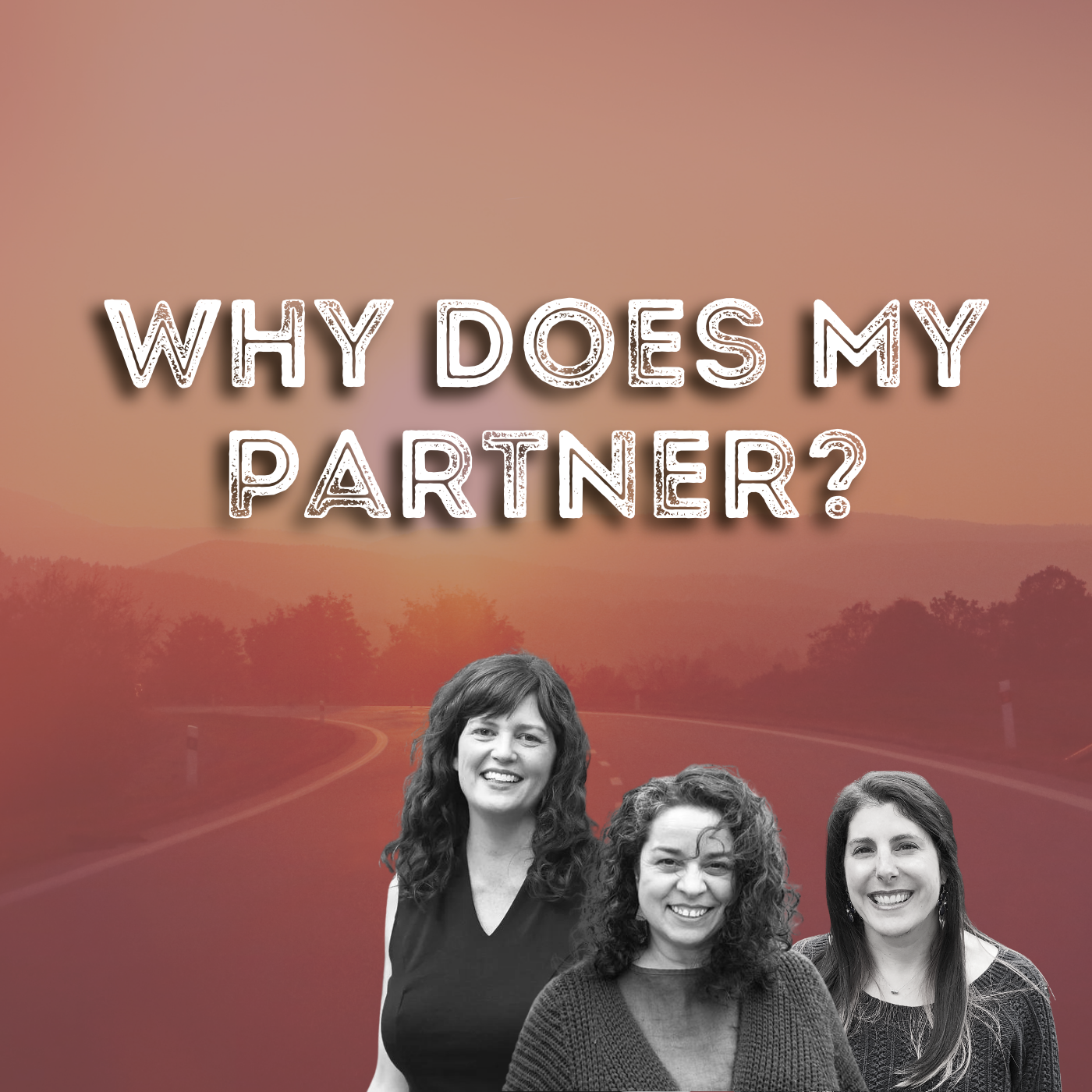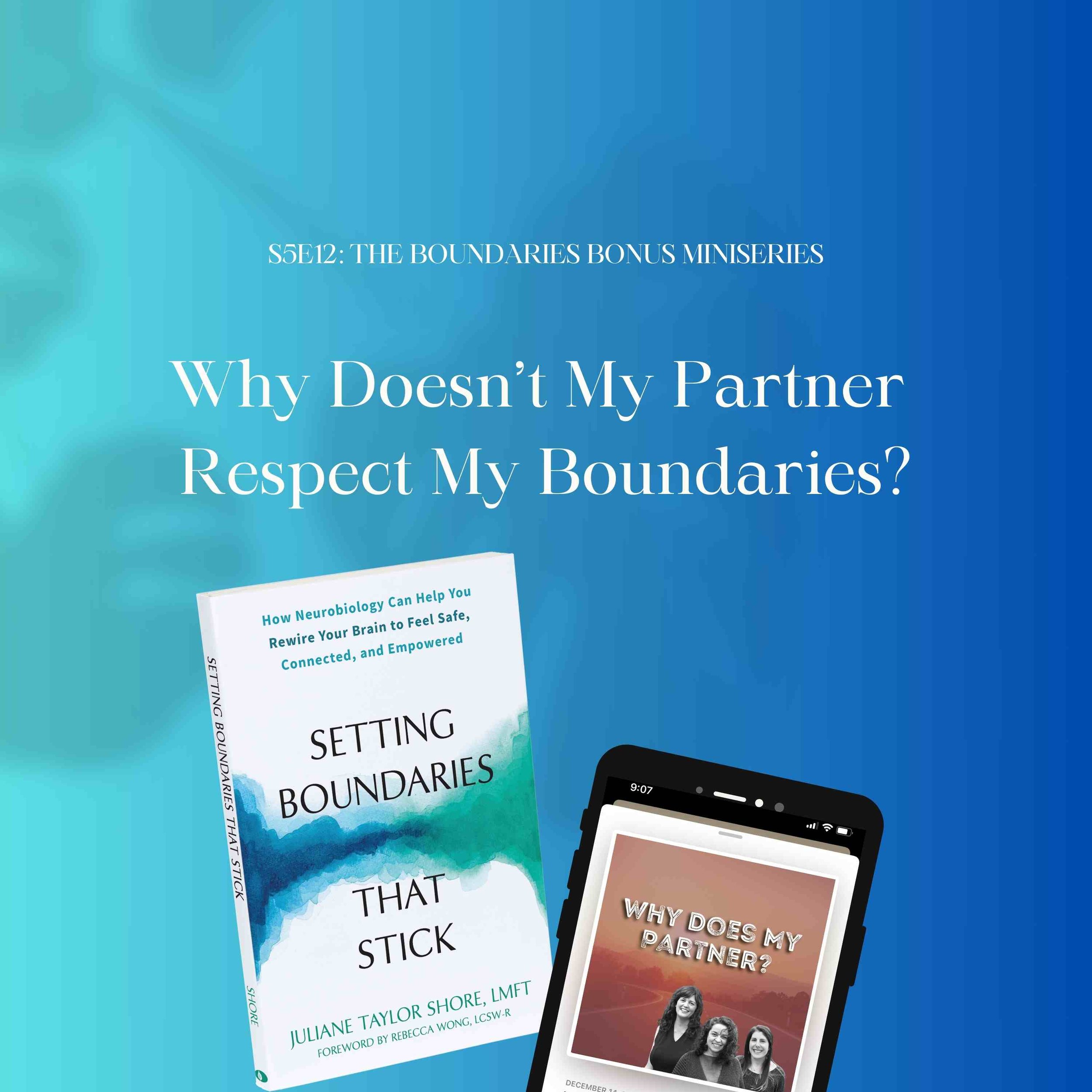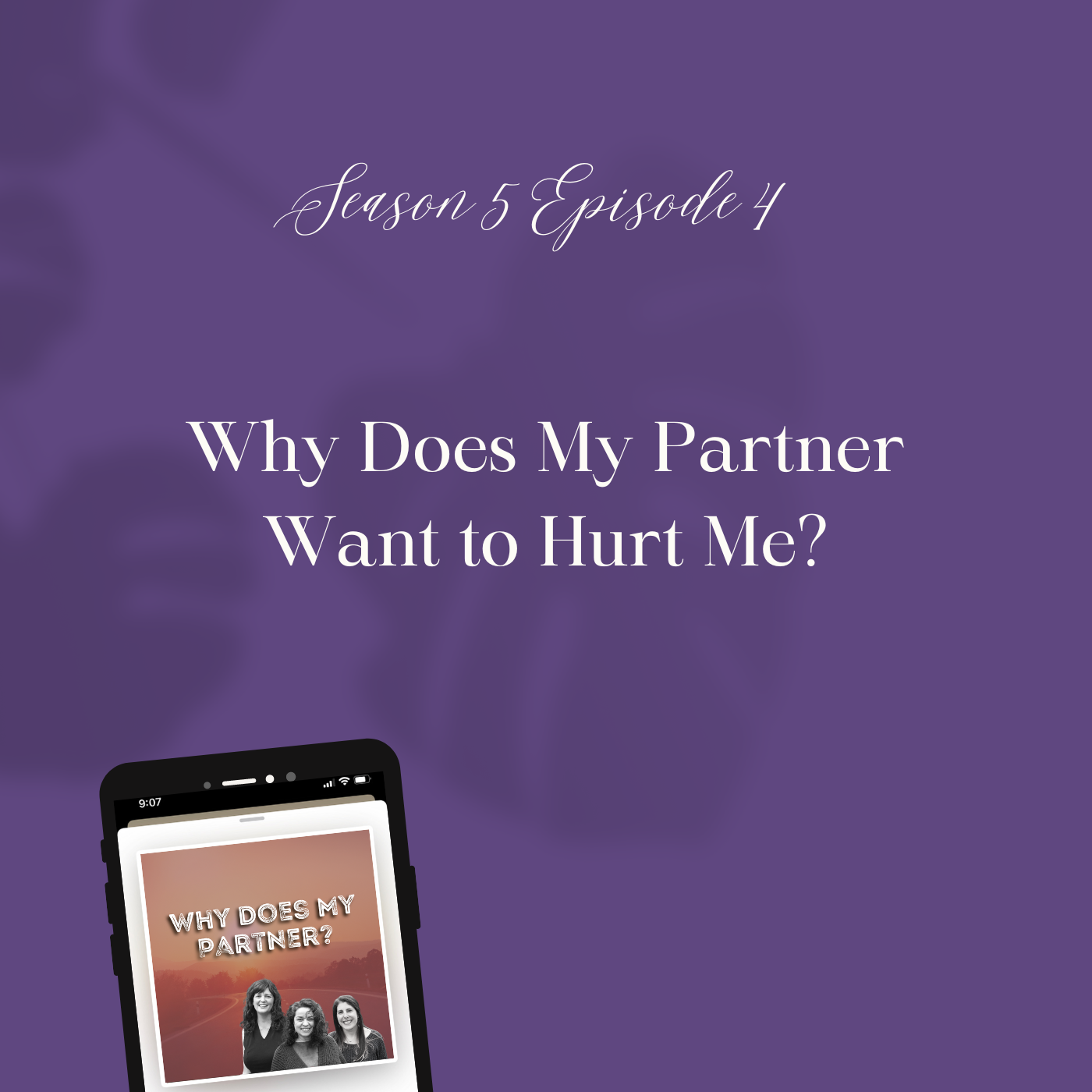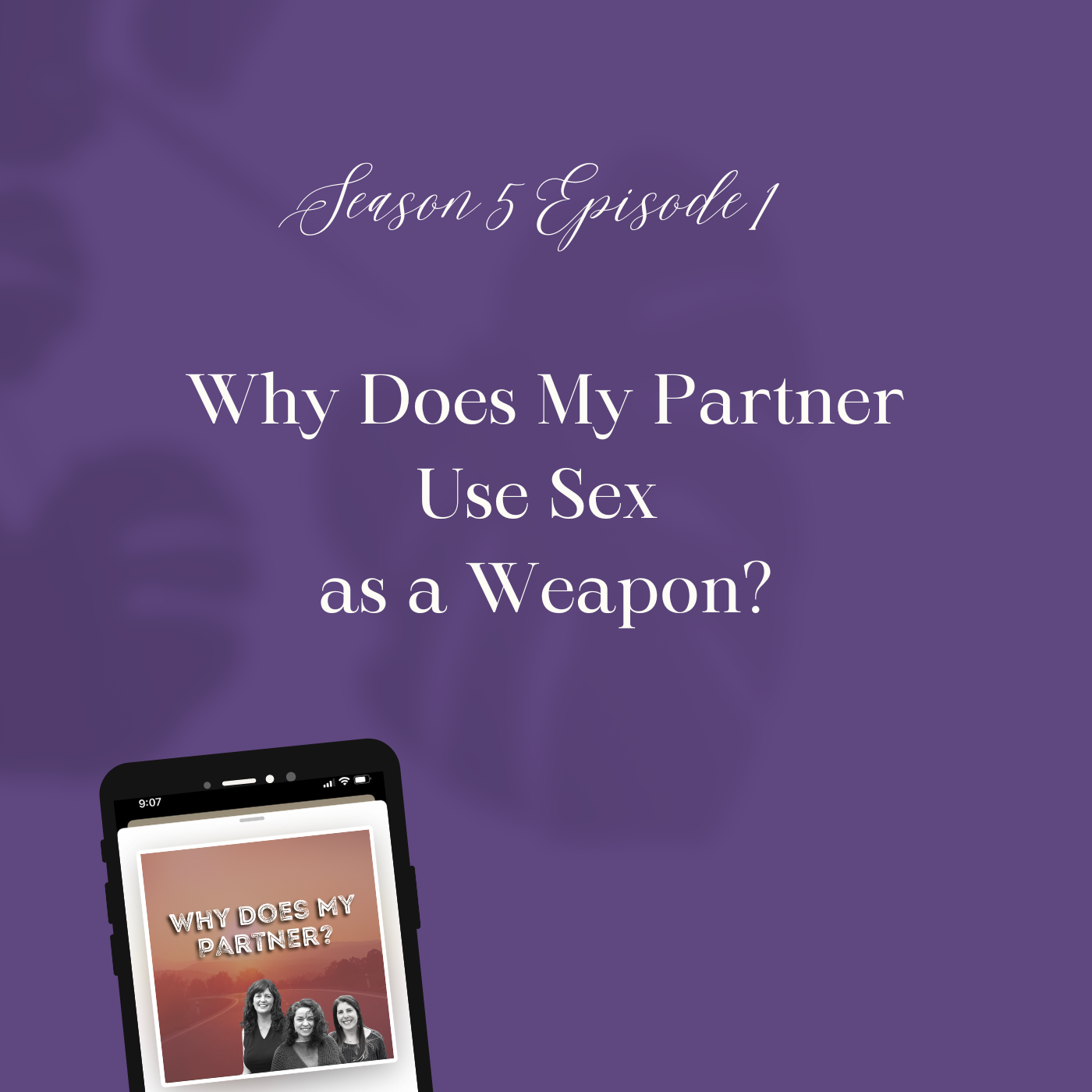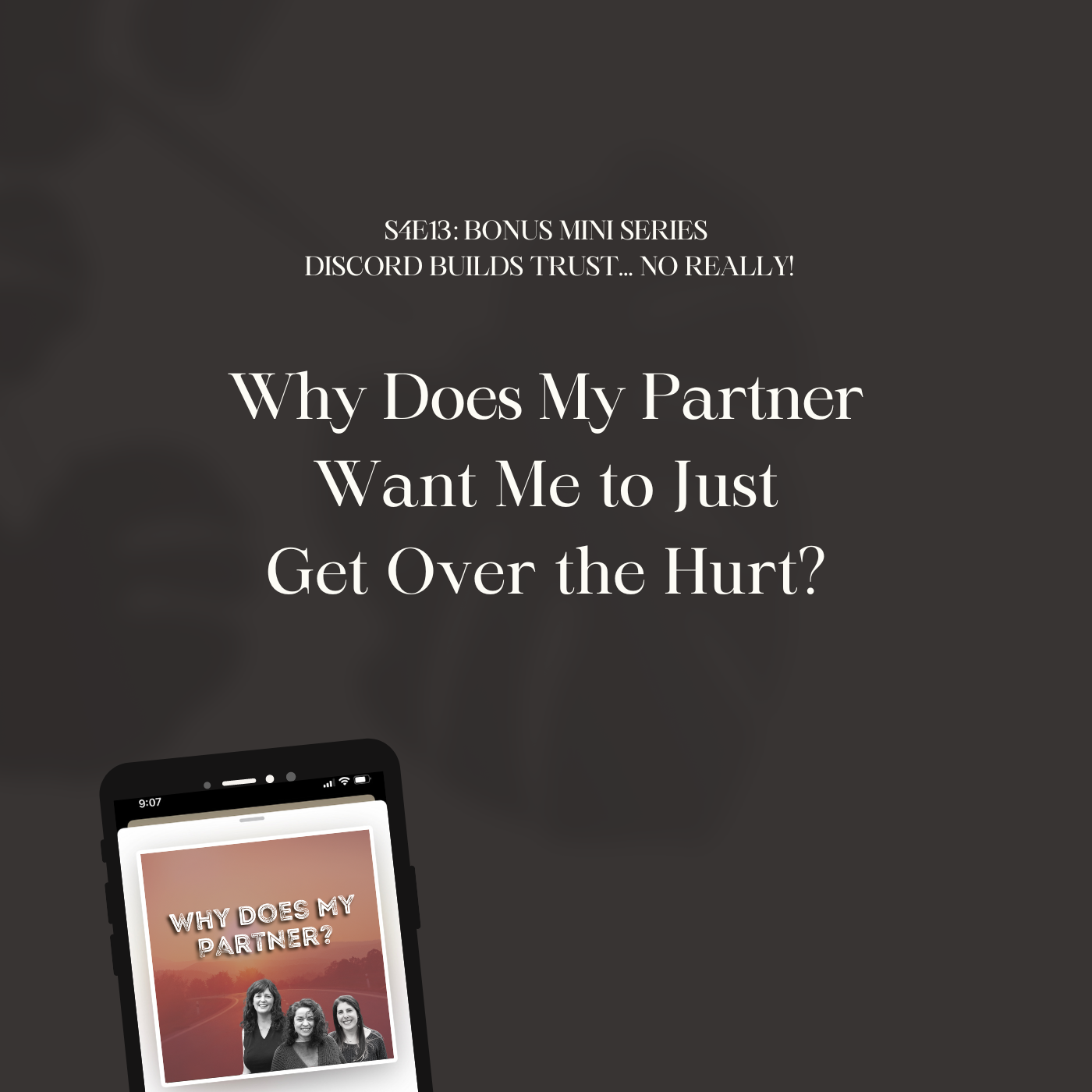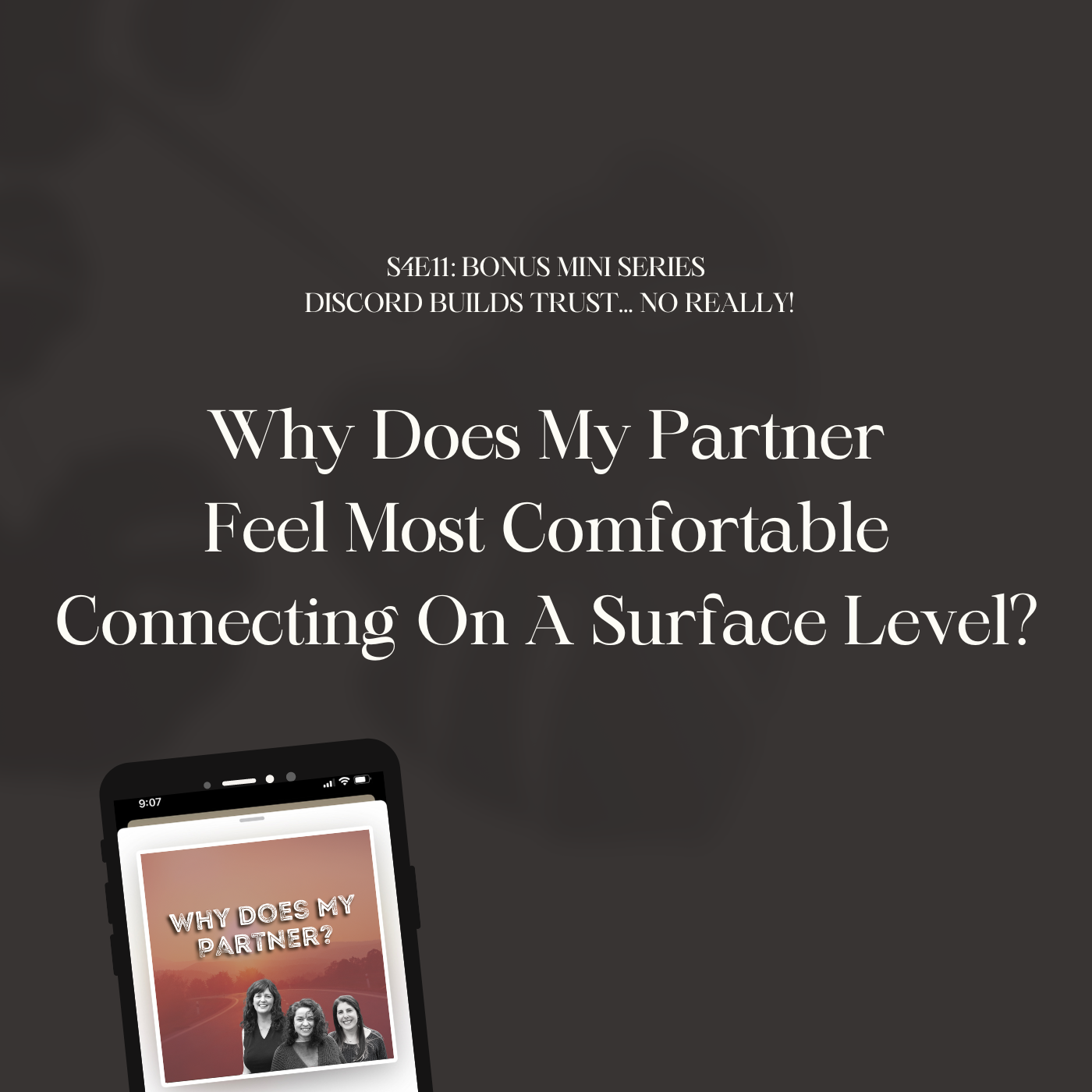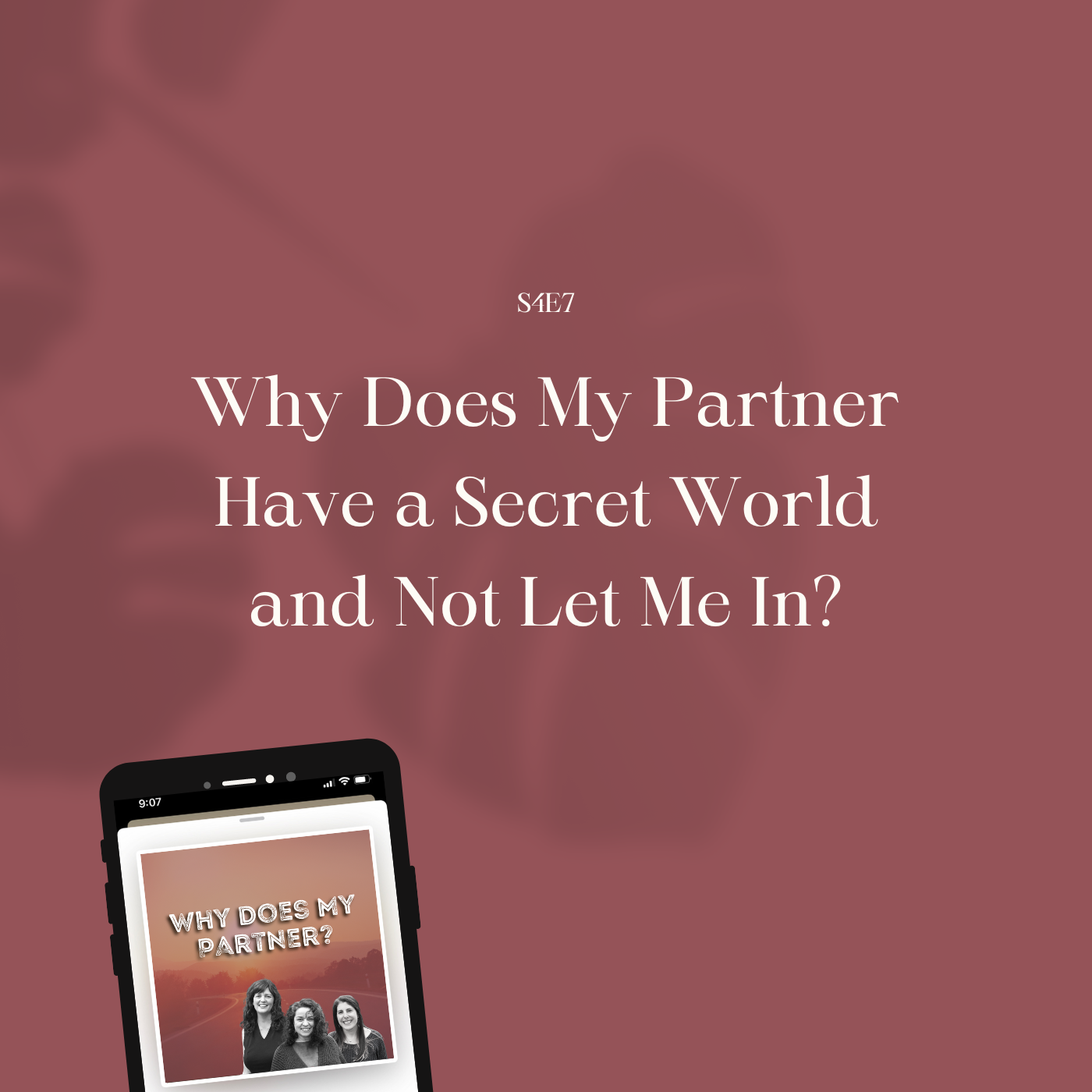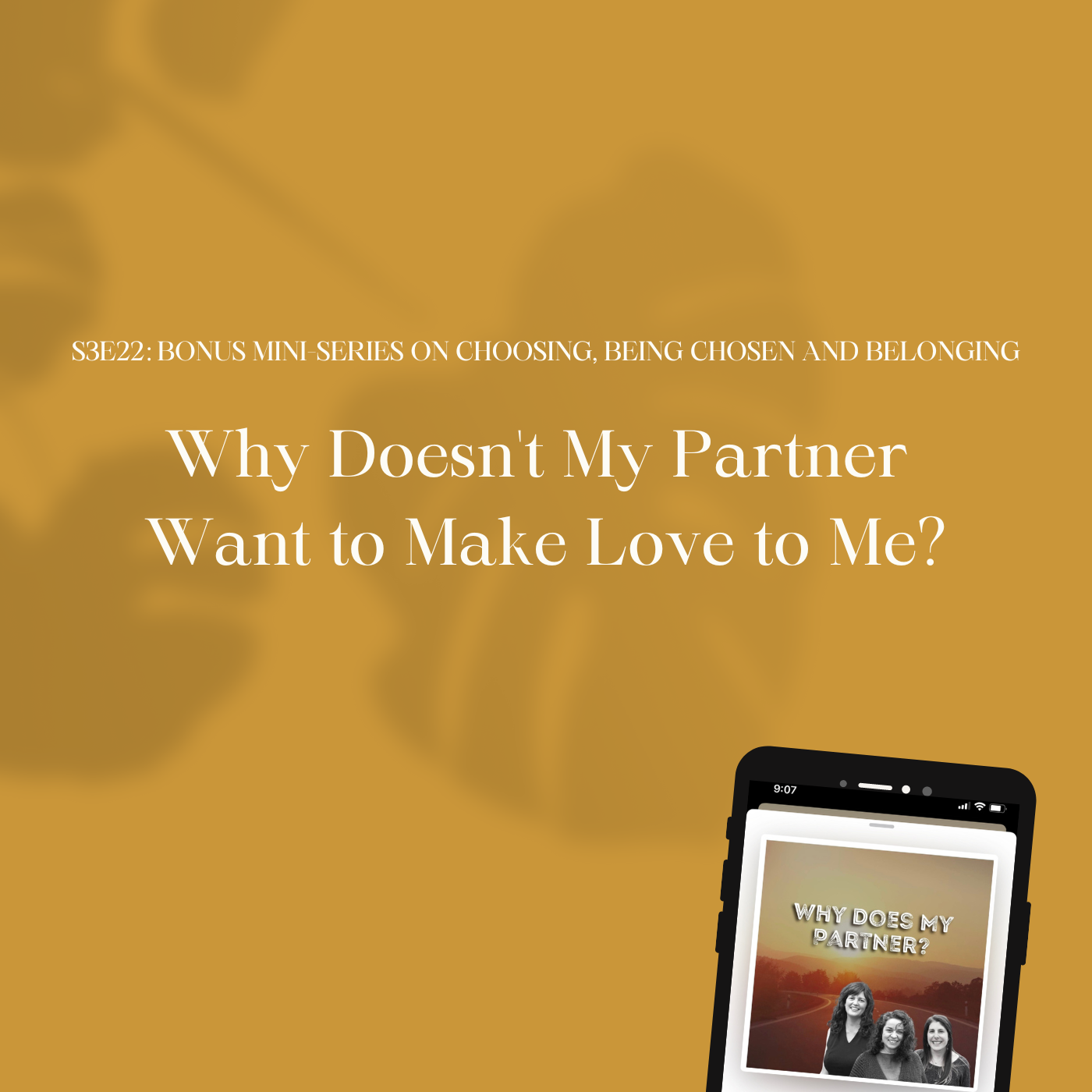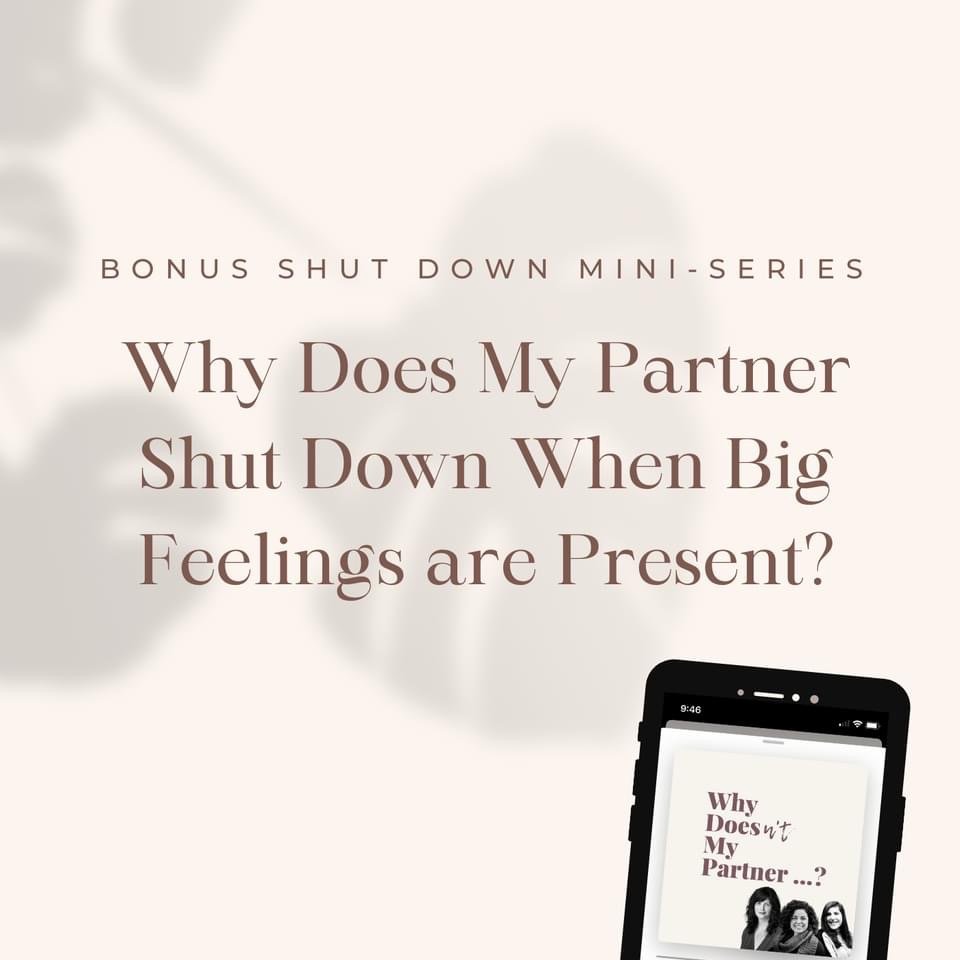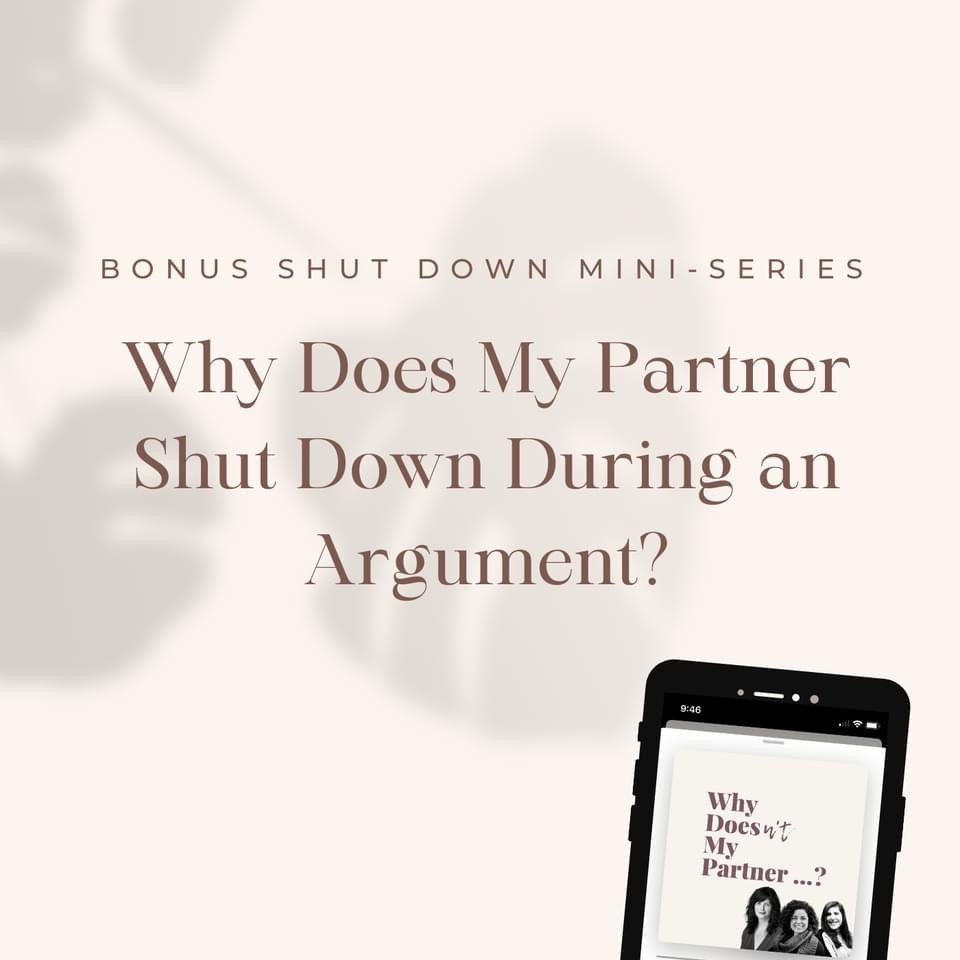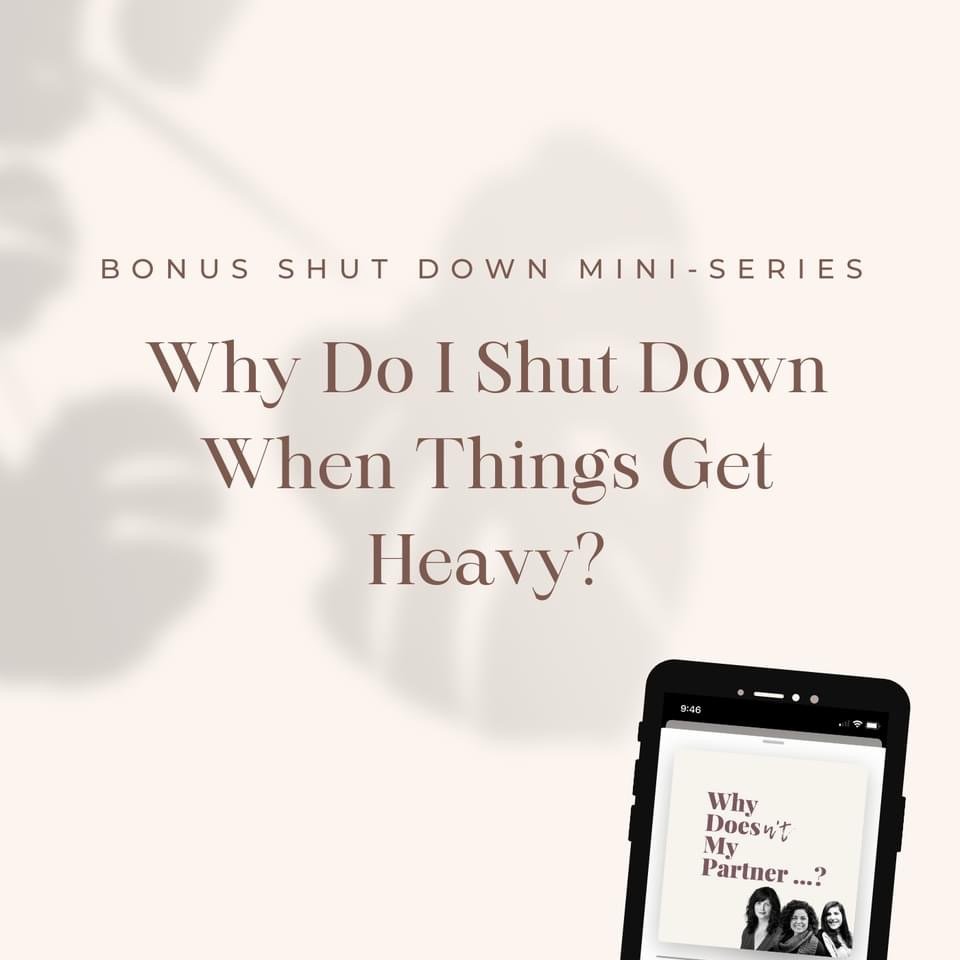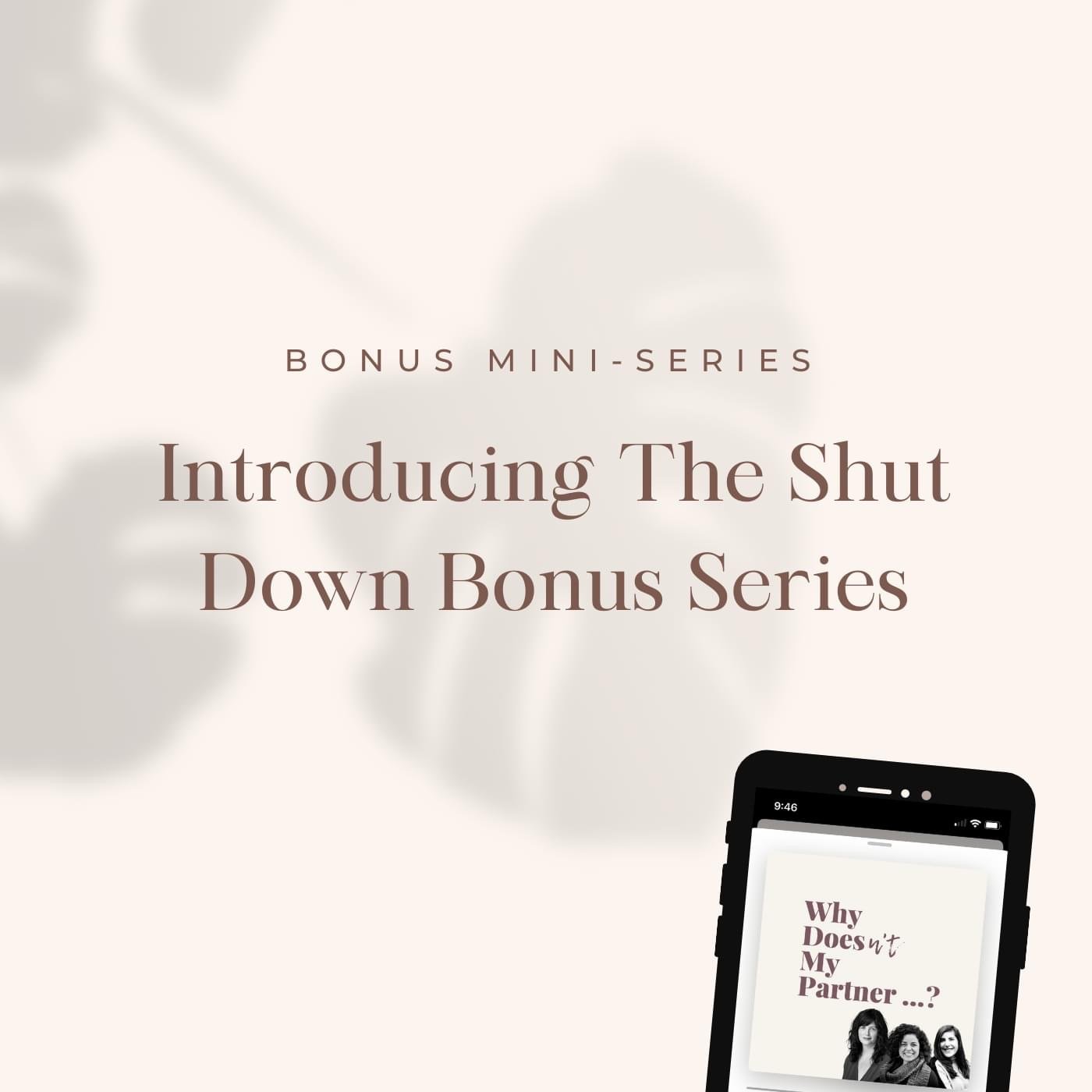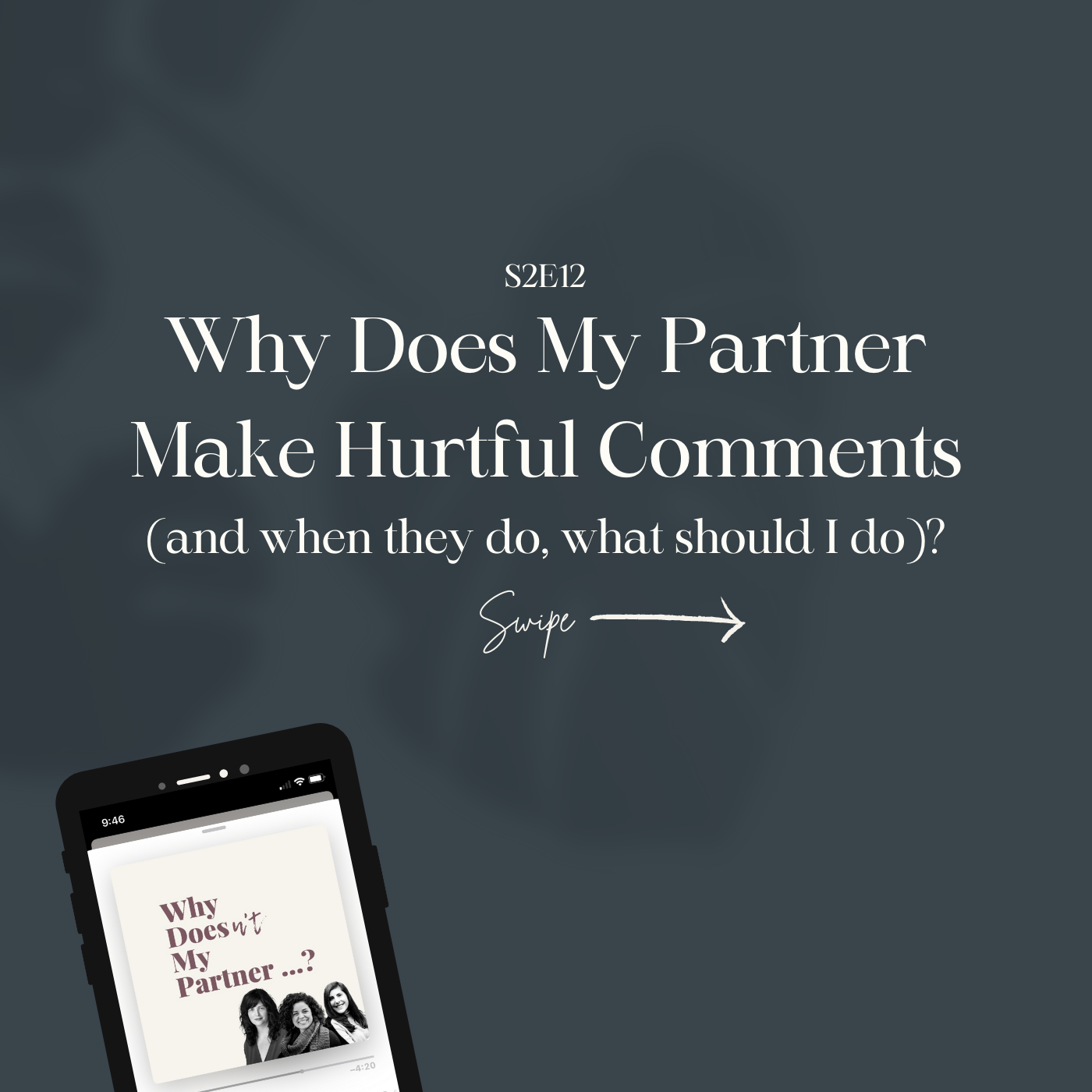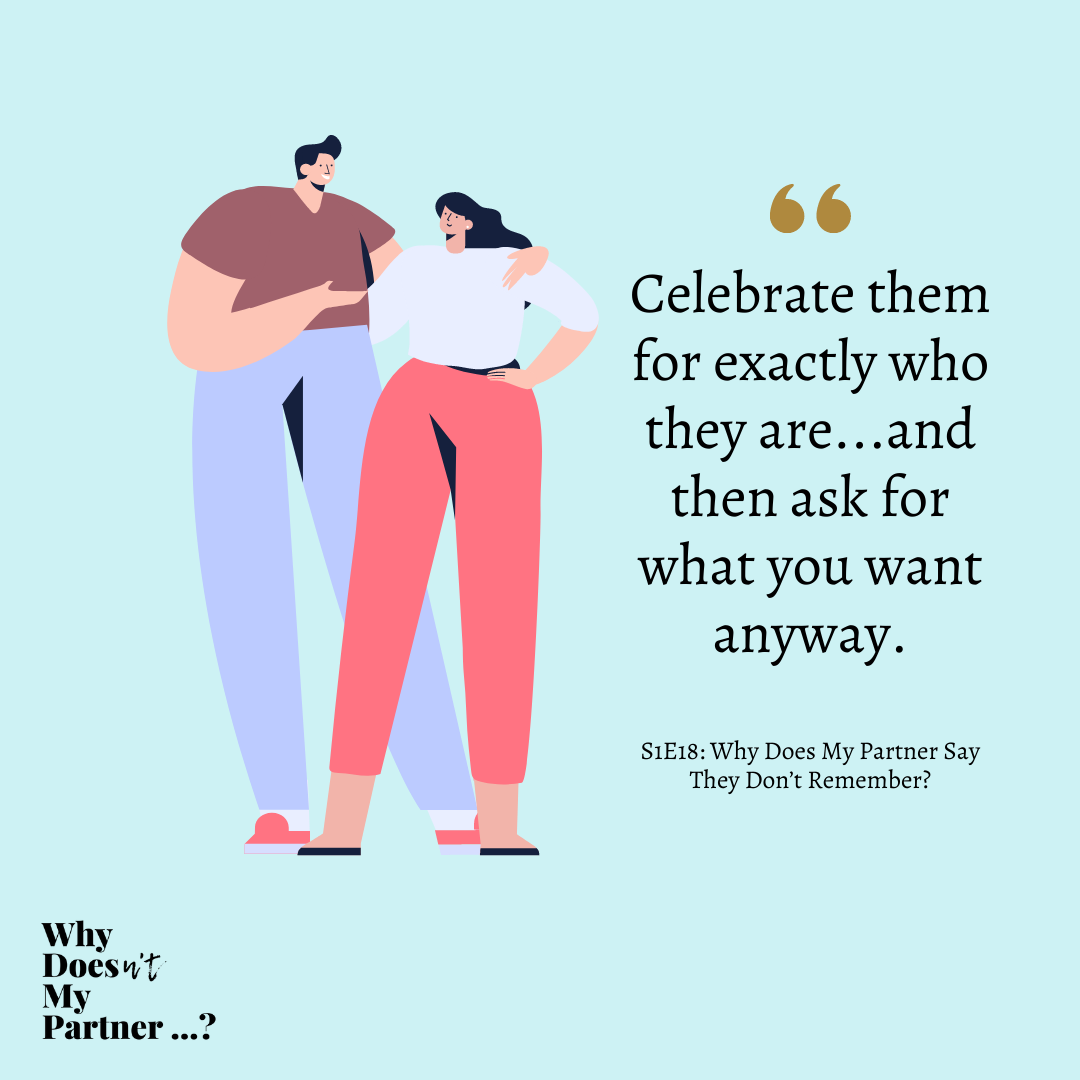PODCAST NOW ARCHIVED
We answer questions from people who want help in relationships.
These questions echo the conversations that take place over and over again in our therapy offices and take us on a dive deep into the skills at the heart of relational intimacy, greater health, and fulfillment.
send us your question to explore on a future podcast episode
This podcast is not a substitute for therapy with a licensed provider.
Our Final Episode
In our final episode, we offer some parting thoughts on how you can keep nurturing healthy relationships in your own world. Thank you for being with us—through every question, every laugh, every moment of truth. It’s been our joy and honor.
Season 7 — The Communication Series
As we reach the end of our season 7 deep dive into communication, it’s no surprise that so many of the same themes have kept showing up in our conversations, and that so often, what they’re about is owning our unmet needs. So it feels right that we should land here, with an episode that unpacks just that, and once again invites us to let go of the strategies we think we need to get what we want, and to get more in touch with the real needs we may be trying to express.
Thanks as always, dear listeners, for sticking with us for yet another season! We’ll be back soon with another miniseries, but in the meantime, we’d love for you to stay in touch! Write in, send us your questions, leave a review, and join us for a workshop!
And as always, love each other the best you can.
How is it that two people could remember an event so differently, and both be so sure that their version is right? Why is it so hard to take in when someone suggests that our memory of something isn’t true? How can it be that two people can both be right about a memory, and at the same time both be wrong? On today’s episode of WDMP, we’ve got a few answers for you, plus a suggestion for how you can start to guide yourself out of this stuck place and into greater intimacy in your relationship.
On this episode we dig into how couples communicate around making plans, scheduling, and navigating social engagements. Like so many of the topics we talk about, there’s no right way to go about it, but what’s important is that there’s an explicit, shared understanding of how it’s going to be in your relationship. Feeling lost on how to get to that place of understanding? Then this is the episode for you!
There are a lot of ways to approach conflict, and some of those ways could even bring you into closer connection with yourself and your loved ones. If that sounds impossible to you, we’ve got a ton of resources to support you. For a start, give this episode a listen, and try out some of what we’re talking about. We think you might end up changing your mind.
“Why does my partner criticize my parenting?” If you’re in a partnership, even without children, there’s a good chance some version of this has come up for you. Whether it’s parenting, pet care, finances, sex, you name it, both you and your partner are carrying a bunch of (often unconscious) assumptions about how something should be done. Coming out of conflict means moving from those implicit beliefs to explicit communication, but how do you do that without blame, power struggles, and hurt feelings? Well, that’s what this whole season on communication is all about!
We love it when our listeners come to us with their YOU-turn already built into the question, not just because it means that what we do is helping someone, but because it means the door is already open for curiosity, vulnerability, and discovery. Today’s question does just that. Join us for a discussion of the vulnerability of taking in advice from another person, feeling really deeply known by your partner, psychological boundaries, and how to come out of defensiveness and into repair.
Humans have a deep need for closeness, to feel known and that those around us care and want to know us deeply. And that can feel really, really vulnerable. In this episode we answer a question all about tangling with different ways of showing and asking for deeper knowing in a relationship. In turn, we offer some questions you may want to ask yourself, and then a few more for you and your partner to open up together. .
The internet (and books, magazines, and a whole lot of couples’ therapy offices) are full of scripts to follow to help partners navigate conflict. But what if your partner wants to use a script that’s just not working for you? Here at WDMP what we try to provide is a lot more like a map than a script. A map doesn’t tell you exactly how to go, it shows you some of the possibilities you have in front of you. It offers opportunities, invites curiosity. It helps you ask “where am I now, where am I heading, and what might be there for me along the way?” Check out today’s episode for more, including a sneak peek at the map we’ll be providing folks at our next Integrating Mind + Heart workshop!
When we start beating ourselves up in front of our partners when they have an issue with our behavior, what is it that we’re actually doing? Can we talk about that for a minute? Actually, we already did, and it’s this week’s of the podcast! Hear us chat about shame pits and grandiosity, listening and remorse, self protection and vulnerability, and…throwing babies? All this and more on the Why Does My Partner Podcast!
As couples’ therapists, the most common questions we get are about communication. But what does it take to make that work in a relationship? That’s such a big question, that we’re dedicating this entire season to talking about communication!
First off, how do you listen when your partner brings up something sensitive? Y’all, listening is really vulnerable. It means putting yourself aside for a moment to be there for the other person and acknowledge that you may have caused them pain. When you’re in that space it’s so easy to get defensive or go into shame and then, you guessed it… you’re not listening anymore!
Never fear, in this episode we’re sharing some key skills for you to try out right away, whether you’re the listener or the talker. So have a listen, subscribe, and as always, take care of each other the best you can.
S6 Bonus Series Featuring Ann Kelley, Ph.D.
Why do I have to feel bad for my partner to feel better? When does venting cross the line and become unloading? Guest host Ann Kelley joins us one more time to talk about power dynamics in relationships. It can feel relieving to unload your frustrations, but is it causing your partner to shut down? Or is the venting partner looking for some kind of feedback that they’re not getting, making them feel like they have to keep unloading till they get a reaction? As always, there’s not one answer, but we can offer a roadmap for how couples can start exploring this for themselves.
We’re back with special guest Ann Kelley of the Therapist Uncensored podcast, and folks, she’s dropping knowledge bombs left and right on this one. Our question for today is from a listener in her 60s, getting ready to put herself out there to date after a divorce.
Welcome back to the Why Does My Partner Podcast. For this bonus mini-series, were joined by Ann Kelley from the Therapist Uncensored podcast to tackle our next set of listener questions. Ann is a licensed psychologist and co-author of Secure Relating along with her wife and podcasting partner, Sue Marriott.
Do you and your partner have rituals when you come back together from being apart? Today’s question opens up our to ways that implicit memories can stir up old learned expectations of what happens when someone leaves us. If you’ve experienced painful separations in your past, your body may still be expecting that, even when your mind knows that nothing is wrong. We talk about how that could show up for either partner in this situation, and Ann shares her unique way of describing attachment styles, and how that can help folks have a smoother separation and reunion in their partnerships.
SEASON 6
Dear listeners, before you start listening to this episode, would you try something with us?
Sit back in your chair. Take a breath for a second. Notice that you’re alive and breathing. Notice the sensations in your body that tell you that you’re alive. As other thoughts start to pop up, don’t try to push them away just yet instead just let yourself notice that they’re there. Notice them, and now go back to your breath. Take your time. What’s happening inside you now?
This, dear listeners, is withnessing, and it’s what this episode is all about. Or listener question speaks to a deep desire to be taken care of by their partner, so we start by asking, “what kind of state are each of your brains in? When you’re worked up and upset, your brain is going to have a really hard time giving or receiving support, even when that feels like what you want to do most in the world. So take a second to slow down. Witness what’s happening inside you and give your brain a chance to shift into a state that’s more interested in connection and bonding. Showing up for yourself is where it all starts.
If your partner asked you to tell them how they should change, would that feel gratifying or scary? And how would you react? If that thought makes you uncomfortable, we think that’s the perfect time for a YOU-turn. And if that thought doesn’t make you uncomfortable…we think that’s ALSO a perfect time for a YOU-turn! That means turning back towards yourself and being curious about what hopes or fears are hidden underneath that reaction. That will help you get beyond the strategy – what either of you do or don’t do – to the underlying need, which is how do you want to feel in this relationship?
Today’s question asker might be wishing that their partner interrupted them less, but that’s not true for everyone. Whether or not you do this has a lot to do with where you’re from, your family dynamics and even your neurology. In lots of cultures, interrupting is a sign of excitement and showing that you’re engaged, but for others, it can feel rude, dominating, and derailing. It could even be different for the same person in different situations. If you take anything from today’s episode, we hope it’s this: celebrate your diversity, whether it’s cultural, neurological, or anything else. We’re all going to do things a little bit different, and that’s ok! Take it as a chance to get curious about what’s going on in your partner’s brain, and to share what’s in yours. We bet you’ll be glad that you did.
Having a trusting relationship means you and your partner never let each other down ever, right? WDMP Podcast listeners know the answer to that one…no way! So what does it mean when we talk about trust in a partnership? Today’s listener question leads us right down that path, unpacking the many different kinds of trust there can be, making explicit agreements and setting expectations, and what to do when your partner goes into defensive mode.
Anxiety is a signal that’s really good at letting you know something isn’t working – the only thing is, it’s not so good at pointing out exactly what that thing is. Diving into today’s question about anxiety in a relationship brings us to unpacking just what anxiety is, attachment styles, culture and epigenetics, and a whole lot more. We also talk about what it means to stop fighting your anxiety and begin to change your relationship to it, and how that can have results that resonate far wider than you might think.
In this episode, discuss some of the ways that someone might end up believing that this is their only option, but we also turn it around and ask, “What are you hoping for here? And have you looked at the cost? Can you find the bravery to try another way?
When we talk about repair, we’re talking about a whole lot more than saying you’re sorry. Sometimes jumping to apologize right away can actually be counterproductive. On the other hand, letting something stay unresolved in a relationship leads to festering hurt and resentment. With today’s listener question, we talk about what happens when one person wants to engage in repair after a conflict, and the other person just isn’t ready to go there.
Plus, we’re now officially celebrating 100 episodes of WDMP! We’re so grateful to each and every one of you who have listened, submitted questions, left reviews, participated in workshops, and in every other way supported us over the past 3+ years of making this show. Here’s to the next hundred! ❤️ Rebecca, Vickey, Jules, & Al
Today’s listener question comes from a partner in a neurodiverse couple, asking us to talk about navigating differences when one partner has neurological differences like Autism or ADHD, and the other is “neurotypical.”
Oh boy do we have thoughts and feelings about this! We end up spending a lot of time sharing how neurodiversity impacts our own lives, helping us discover that it’s not about one partner being different, but about accepting the reality that we’re different from each other. Inside of that, we find a lot of unspoken expectations, fears, and hurts, but…we also find a whole lot of amazing opportunities.
Our brains are taking in an incredible 11 million bits of information per second! Thank goodness we’ve got our salience neural network - system of neural connections -- that filters all of that down to an amount we can actually take in and process! But that also means that there’s actually a whole lot going around us that we never perceive on a conscious level. So how do our brains decide what to take in or not? What happens when your partner’s salience network isn’t taking in exactly the same things as yours? It’s episode 2 of season 6 of the Why Does My Partner Podcast, enjoy!
Here we are in season 6 of the Why Does My Partner podcast! We want to start out with a question we’ve been getting a lot, especially since our boundary mini-series (go back and give that a listen now if you haven’t already!). It goes something like this:
“I get that practicing boundaries means working to not personalize others’ actions, but also…isn’t it fair to ask them not to do something that doesn’t feel loving to me?”
Of course, it’s fair! Take a listen to this episode to hear our thoughts on just that, as well as how practicing your psychological boundaries can actually mean speaking up for yourself more, not less, plus much, much more!
Bonus Min-Series: BOUNDARIES
For this final episode of our bonus series on boundaries, our listener question is about struggling to say no to physical touch from their partner when they don’t feel like it, and wondering “is there something wrong with me when I want space?”
No, dear listener, there’s nothing wrong with you, and that goes for anyone listening who’s ever felt the same. It’s okay to want space sometimes, it’s okay to express what kind of touch does or doesn’t feel good to you, and more than anything, it’s ok to talk about these things.
So many of us have come from homes and cultures where we were never taught how to say no or have had experiences where we wanted to say no and couldn’t. When that history gets carried into our relationships, it can show up as unspoken feelings, resentment, and shame that gets in the way of having those open conversations that make sure there is real, enthusiastic consent.
Y’all, this episode is jam packed. We’ve got not one but TWO questions from listeners that get us diving straight into you-turns, compassion practices, times out and times in, and so, so much more. Both questions start similarly: “why does my partner push me until I…” but once we scratch the surface, it’s not too long before we discover the real question: “When I feel pushed, why do I end up acting in ways that don’t feel good to me?”
That’s what boundaries are all about, folks. Keep listening for some practical tools that will help you develop the brain space to accept that your partner is not always going to behave in the way you want them to, and that’s just not something you’re going to be able to control. But when you learn to pause and treat yourself with compassion instead of harshness, you’ll start to find the space to make choices that allow you to live up to the version of yourself that you want to be.
This is a really special episode of WDMP to share with you! Our regular listeners know that we don’t shy away from sharing examples of our own relationship work on the show, but today Vickey takes it even further, signing herself up to do some psychological boundary work of her own right here, on air. As you follow along with Vickey, you’ll learn how to discern what really is or isn’t about you in a conflict, as well as how to listen with acceptance, allowing and valuing your partner having their own feelings and process, without feeling threatened or hurt.
These exercises are based on Jules’ new book Setting Boundaries that Stick: How Neurobiology Can Help You Rewire Your Brain to Feel Safe, Connected, and Empowered, available now for pre-order at all major booksellers. We’re also so grateful to Vickey for bravely sharing her process, and of course a HUGE thanks to her husband, Gabe, who also gave his blessing to share this with you, our listeners, even though he wasn’t there to record.
Finally, join us next week when we talk about containing boundaries!
It’s episode 2 of our mini-series on boundaries, and we’ve got a listener question that we think a lot of our listeners are going to relate to. Truth is, boundaries aren’t about getting other people to do what you want. Actually, what they are about is deciding what you’re going to do when something happens that you don’t like, and then sticking to it. In this episode, we continue our discussion of Jules’ 6 steps for boundary setting with some guidance on communicating your needs and wants and how to create your plan for setting an external boundary. If you haven’t already, check out episode 1 on the mini-series to get caught up on our introduction to boundary-setting, and stay tuned for next week’s episode. We’ll be getting into what happens when boundaries are set, and how to deal with all of the feelings that come up, whether you’re the one setting the boundaries or the one having boundaries communicated to you.
Guess what, Jules wrote a book! It’s called Setting Boundaries that Stick: How Neurobiology Can Help You Rewire Your Brain to Feel Safe, Connected, and Empowered, and to celebrate, we’re doing a five-part mini-series all about setting and maintaining boundaries that actually work. In this episode, Jules talks us through her 6 steps for setting external boundaries, or the boundaries that communicate to others what is and is not ok for you, the boundary setter. Join us to hear about why boundary setting is really all about you, not the other person, and stay tuned for more in episode 2, out next week.
SEASON 5
It our final episode of season five, and the question we’re answering today is “Wouldn’t it just be easier if we were all the same?” Okay, that’s not exactly true, but we are talking about navigating differences within your partnership, especially when kids are part of the picture. The question starts off with a disagreement about how to mark holidays and important life events, which gets us wondering about the role of ritual and tradition in each of these partner's lives growing up, and the meaning they’ve taken from that into their lives together. What are the needs each of them is expressing inside of the strategies they are disagreeing about? If we explore those needs, we can start to get at all the implicit learnings that are coming in with them, transforming the argument into a creative collaboration.
What if a relationship ending didn’t mean it was a failure? It’s our second-to-last episode of season 5. We’re answering a question that takes us inside some complicated relationship dynamics, from open relationships and polyamory to long distance and relationships with a time limit. We offer a big YOU-turn for you when you’re wondering what your partner is thinking or feeling about an issue and offer some compassion for your protective parts that want to “get you out of hard.” Finally, listen until the end to hear what each of us really thinks about open relationships. Spoiler: it’s three different things!
It’s another two-fer episode today, with a pair of questions that have to do with partners interrupting or getting annoyed when the other partner wants to talk about feelings. Plus, we’ve got WDMP producer/music therapist Al Hoberman back on as a special guest!
When is it a good time to bring up 'feelings talk' in your house? During dinner? Before bed? While watching TV? A big part of having these kinds of conversations is knowing when your partner has the capacity to be there with you. And for the listener, it’s so much easier to have capacity when you know how the speaker wants you to be there for them. That’s why we’re spending so much time in this episode on having meta conversations about how and when you and your partner can show up for each other. That means learning to balance short term tension with long term pain, separating vulnerability from shame, and learning how to be with someone’s process.
Today we have an extra special episode of Why Does My Partner, as we welcome our special guest, Al Hoberman! Besides being the sound editor and producer of WDMP, Al is a music psychotherapist in private practice. He’s joining us for this listener question, which takes us down the rabbit hole of asking “Just what is a feeling anyway? How do you know when you’re having one, and what counts as ‘talking about them?’” We get into socialized gender roles, communicating without words, learning to tolerate disagreement, and creating a pausing practice to up your self-compassion.
Plus, finally we get to talk about Jules’ new book, Setting Boundaries That Stick: How Neurobiology Can Help You Rewire Your Brain to Feel Safe, Connected and Empowered. Available December 1st at a book seller near you!
What happens inside of your relationship when things in other parts of your life start to get stressful? Maybe it feels like you have less time to dedicate to your partner, or that your energy is just completely spent after a long day, and you just don’t have it in you to be present and relational. That’s the topic of today’s question, and it takes us into a conversation all about integrated vs. unintegrated brain states, windows of tolerance, and why scheduling your spontaneity is such an important part of cherishing your relationship.
Congratulations! You’ve been working hard on this relationship, and it really feels like you’re getting to the next level. So why is it that everything your partner does is so darn annoying? If that’s happening for you, you’re not alone. In today’s episode, we’re discussing why we always seem to pick a partner who knows exactly how to push our buttons, and what that can tell us about our own psychological floor. Keep listening to learn about inner fix-it protectors, why we don’t believe in finding “the right one,” and how if everything your partner does annoys you, that could actually be a good sign.
We talk about hurt a lot on this podcast, so much so that we released a whole mini-series called “Discord Builds Trust...No Really!” (Check it out if you haven't already!) So when this question came along, we had a lot of angles to cover. We discuss making YOU-turns on the stories we tell ourselves about what’s happening, and when lashing out is really about a deep desire to connect. We also talk healthy distance, and how sometimes compassion means taking care of yourself, not sticking around for the hope of relational safety.
The resource mentioned in this episode is the book Archaeology of the Mind by Jaak Panksepp and Lucy Biven.
What do apes, grapes, and celery have to do with each other? They’re all on today’s episode of the WDMP podcast! Our listener question brings us to exploring what lies beneath the desire for fairness, and what’s really being communicated when one partner is feeling resentful or underserved. Topics include what it means to attack from the victim position, inherited expectations, and flinging poo. No, really!
We’re not going to lie, today’s question hit home for a lot of us here at Why Does My Partner HQ. We’re sharing our stories of relationships where it was hard to let go as we respond to this listener, whose partner keeps breaking up with her and getting back together...now more than seven times.
There’s some big YOU-turns to be made in this story, and at the center of it all is the question, “What would happen if you said: ‘No, I don’t want this?‘” Would there be grief that you’ve been avoiding? Fear of being alone? These answers could be "yes" for either person in this story. And it could also be that there’s a process going on here, and in that back and forth, there’s some kind of learning or repair going on. So, the YOU-Turn is also about realizing that if that’s what’s happening, and it doesn’t feel okay for you, what’s the cost of letting it continue?
Here we are with Season 5 of the Why Doesn’t My Partner podcast! This episode is about mismatch, but don’t let the title fool you - it’s not just about sex. It’s about the discomfort of experiencing mismatch in your partnership, and the shame of wanting something that maybe somewhere in your life, you’ve learned is not okay. Starting with this You-turn, we cover topics like discovering your psychological floor, and how to notice the subtle cues that tell you you’re nearing it. How do we open up about our ingrained beliefs around what’s okay when it comes to sex? What does it mean to move from a culture of shame to a culture of pleasure?
Today’s invitation is to start building a map of your relationship to sex, sexuality, and pleasure. What are all the things you’ve learned from your family, culture, society, and your past? Next, what do you know about your own desire? About what does or doesn’t feel good to you? And how has that changed over time? Because it probably has! Once you’ve done that, take a listen to the episode for an exercise you can do with your partner to get the conversation started.
Resources mentioned today are Sex When You Don't Feel Like It by Cyndi Darnell, Come as You Are by Emily Nagoski, and Magnificent Sex by Peggy J. Kleinplatz and A. Dana Ménard.
Bonus Series: Discord Builds Trust…No Really!
Is there one person in your partnership that always brings up the issues? Whether that’s you or your partner, chances are there are some real feelings of disconnection and loneliness all around. On today’s episode, it’s all about how our attachment styles guide our gut instincts to either distance ourselves from conflict or try to smooth it over right away. We discuss what might be happening when there’s a mismatch between those two styles in a partnership, and how stepping up and learning to raise issues is an amazing way to show your partner that they’re being seen and heard. Of course, we offer you some tips on how to get into those conversations, and even discuss what to do to help short-circuit the anger and resentment that might be building up, helping both you and your partner come together more relationally.
We want to thank you all, our dear listeners for staying with us through this, our fourth and final episode of the Discord Builds Trust…No Really bonus mini-series! We hope that these episodes have inspired you to start leaning into the messy moments in your own lives, risking a little discord, and building a little trust…no, really!
Thanks again for listening, and we hope you join us again in just a couple of weeks for the launch of Season 5 on July 18th!
Ok, so maybe we’ve convinced you that Discord Builds Trust (No Really!). You’re on board, you’re practicing sitting with your learned beliefs, and you're cultivating curiosity. Now the moment arrives. There’s disconnect, hurt, something went wrong. What do you do? How do you get out of this place and into the trust (no…really!)
On today’s episode of our mini-series, the question is “Why does my partner want me to just get over the hurt?” We start off flipping the question on its head and pointing out some unspoken feelings inside of that question, which takes us into picking apart the difference between toxic shame and remorse. Finally, we share some strategies for getting out of that shame pit and into a more relational space, ready for repair.
Check out this framework for apology and accountability from Mia Mingus, which we reference in today’s episode.
Hello and welcome to episode two of our mini-series, Discord Builds Trust…No Really!
It’s such a natural, human thing to want to avoid conflict. We all do it! But when we do, we’re missing the chance to have a new experience of trying something hard with someone we love, and finding out that we can do it. That’s why we call it earning trust.
Our bodies and our brains are primed to remember past struggles and do everything they can to protect us by avoiding the same thing happening again. That doesn’t just apply to our own lived experiences, but also to the generations of learning that have been passed down to us from our ancestors. They teach us that certain things aren’t ok to bring up, are dangerous to even think or feel. That’s what Resmaa Menakem is talking about when he says, “Trauma decontextualized in a people over time can look like culture.”
In this series, we’re inviting you to become more aware of these learned beliefs and to sit with them with compassion and kindness. When you do, you have a golden opportunity to blend that learning with other parts of your brain that can take in the world around you as it’s happening right now.
You may want to try this exercise from Dan Siegel, which we share in today’s episode. It’s an acronym called BASIC: Behavior, Affect, Sensation, Image, Cognition. Take it one piece at a time, in any order, asking yourself the questions and observing with curiosity and kindness:
Behavior: What am I doing right now? Is my body being pulled to move, or not move in some way?
Affect: What am I feeling? Can I notice it and give it a name?
Sensation: What are my five senses taking in, and what am I feeling in my body?
Image: what images come to mind when I sit in this place? Pictures? Sense memories?
Cognition: What thoughts am I having? What meaning am I making up about what’s going on inside and around me right now?
We’re back, dear listeners, as promised with a bonus mini-series: Discord Builds Trust…No Really! We’re not kidding with you on this one. So then why are we sometimes more comfortable with superficial, surface level topics? We’re opening up this conversation by acknowledging that intimacy is hard, and vulnerability can be scary, and wait – just what is a surface level topic, anyway? The truth is, if you’re feeling like there’s a mismatch between you and your partner on how deeply you’re connecting, there’s a lot of reasons why that could be the case. What feels comforting and close to you might feel invasive and controlling to your partner, and what is light and playful to them could feel superficial or avoiding to you. In these moments of discord, when our visions of what we want our relationships to look like come into conflict with who our partners really are, that’s when we can put aside our agendas and approach the conversation with curiosity and connection, with a real desire to learn something new about our partners and offer them the opportunity to learn something about us, too.
SEASON 4
Here it is folks, our last episode of season 4! Today’s conversation sums up so much of what we’ve been talking about this season, from slowing down and having the tough conversations, to building trust, to what does it really mean to practice boundaries, anyway?
Welcome back to the WDMP Podcast. Today’s question leads us into exploring what we each understand sexual intimacy to mean, and what we can do if that understanding doesn't seem to line up with our partner’s. We’re encouraging you, dear listeners, to start to learn about and understand your own sexual templates: what are your likes and dislikes, what are some of the beliefs you have about what those preferences mean, and what in your history has led you there? When you and your partner each engage in that personal work, then there’s an opportunity to talk to each other, confront the projections that might be going on, and come to a place of greater intimacy and understanding.
Welcome back to the WDMP podcast. Today’s listener question asks about a partner who says there’s nothing wrong, but the asker is worried he’s holding back. We take this into a discussion about trust, and how embracing discord gives you an opportunity to strengthen a relationship. We cover what it means to repair after discord, what the research is telling us about conflict and repair, and how often we can really expect that repair to happen…at least in the way we were expecting it.
Today’s Resource is The Power of Discord by Ed Tronick and Claudia Gold
Would you know everything about your partner? Like, really, really everything? There’s a delicate balance in every relationship between the intimacy of knowing each other deeply and keeping the magic alive with a bit of mystery. In today’s episode, we get into how intimacy comes from knowing a lot about our partner, which makes us feel safe, while mystery – leaving some things unknown – brings the thrill of discovery, intrigue, and passion. Too much safety, and you might not have enough passion, but too much mystery can lead to feeling unsafe and insecure. That’s where we find today’s question asker, who wonders what’s going on when their partner seems to disappear into his inner world, leaving them behind. We discuss some of the possible obstacles to sharing and get into what it actually means to pay attention to your own internal experience. Finally, we finish up with an offer for you to get curious and open up a conversation with your partner that invites closeness and discovery.
For those wanting to learn more about mystery and intimacy in relationships, here’s Esther Perel’s book Mating in Captivity, as well as her Ted Talk, “The Secret to Desire in a Long-Term Relationship”
Welcome back to the WDMP podcast! Rebecca is bringing the question today so that we can go deeper on the language of “power over, power under, and power with.”
We live in such a hierarchical, win-or-lose society, it's no wonder that we learn to think of power as a zero-sum game, where we compete for who has more control, more influence, more freedom to act. But when we learn to switch to power-with thinking, where power is an abundant, shared resource, all of a sudden it’s a lot more messy, a lot less black and white, but there’s room for everyone’s voice to matter, and to have something important to say.
So how do you bring this power-with viewpoint into your relationship? You guessed it, it’s about vulnerability. We’re inviting you to let go a little bit of your fear of losing power, and trust that when you empower others, it empowers you too.
Resources from this episode:
All About Love: New Visions by bell hooks
Brené Brown's TED Talk, the Power of Vulnerability
Sand Talk: How Indigenous Thinking Can Save the World by Tyson Yunkaporta
Can remorse be empowering? Spoilers for today’s question, which comes from a listener who finds themselves doing the comforting, when it’s their partner who was doing the apologizing. What’s up with that? Realizing that you’ve hurt someone can bring up feelings of shame and guilt, especially when it’s someone you love. But letting that shame take over can take the focus off doing the repair work you and your partner need after that hurt. We discuss where that shame comes from, and how the alternative – remorse – actually helps you get out of feeling social threat and lets you hold both you and your partner a little more tenderly.
It’s a fun one today on the WDMP podcast as we answer a question that’s sounds at first like it’s about hobbies and taking time for things we enjoy, but really gets down to how we distribute resources in our relationship. We discuss how conflicts over fairness can come up when one or both people in a couple are feeling depleted, anxious, or envious, and how to get out of that trap. We’re talking skills like getting curious, making You-turns, and direct requests.
Welcome back to the WDMP Podcast. Instead of a regular question, today we're answering a listener's request to talk about the dynamics between interracial couples and the conflicts that arise from their cultural differences.
We take it as an opportunity to slow down and acknowledge that there's so much that comes with this big, heavy topic. There's the weight of inherited hurt and oppression, the weight of silenced voices and marginalized bodies. Of trying to do things differently - maybe even better - than those who came before us. We discuss how this situation can be ripe for misunderstanding as each person brings generations of meaning and experience into the relationship, which could be totally different from their partners. Finally, we share an embodied practice for pausing, checking in with your inner vibrations, and letting yourself imagine what could be and being honest about what you don't know.
Welcome back to the WDMP podcast! Here in our second episode of season 4, a listener brings us his concerns about his wife’s friendship with a lesbian coworker. We get into topics like feeling dismissed, building trust, and navigating bumpy conversations with your partner where there are lots of tender feelings on both sides. We discuss how healthy boundary-setting isn’t about controlling your partner, it’s about knowing your own limits of comfort, and talk about a way of negotiating boundaries with your partner that helps you both slow down, stay curious, and turn this conflict into an opportunity for greater intimacy.
We’re back with season four and starting off with the big ones. Today’s question gets Jules, Vickey, and Rebecca asking, “what the heck does ‘relational’ even mean?” It’s a word we use all the time here on the WDMP podcast, so could it really be that you and your partner could have totally different ideas of what it means to be relational? And if that’s true, how do we turn that discovery into an opportunity to co-create our shared relational space?
In true WDMP style, the answers we explore are equal parts brain science, you-turns, and a gentle invitation into vulnerability and a deeper connection to yourself.
Bonus Mini-Series: Choosing, Being Chosen & Belonging
Welcome back to the WDMP podcast and to the third episode in our Mini-Series on Choosing, Being Chosen and Belonging. This episode covers the topic of sexual intimacy in relationship, if that affects how, when, or if you choose to listen we want you to know that ahead of time.
In this episode we're answering the question "Why Doesn't My Partner Want to Make Love to Me?" We're discussing rejection, expectations, and vulnerability. We're inviting listeners to wonder what happens in your body, or floating in the back of your mind, as you think about how likely it is for you to take sexual information (the gesture, the look, the initiation, etc) personally and explore what stories you are making up and loosen the grip those stories have on you so you can enter these conversations with curiosity/interest. We offer you-turns and tools to help you meet vulnerability with vulnerability.
Welcome back to the WDMP podcast and to the second episode in our Mini-Series on Choosing, Being Chosen and Belonging.
In this episode we're answering the question "Why Does My Partner Look Outside for Things to Make Them Feel Good About Themself?" In answering this question we're discussing self-worth and how self-worth is buoyed up if you have an inner sense that you're not-enough. We explore the ways we may replace our absence of experiencing belonging with attempts to "fit in" and explain the difference. Belonging celebrates us for all of the different aspects of ourselves, allowing us to trust we can move through conflict and discord while honoring each other's differences. We explore a range of upside down forms of boosting one's esteem and offer our typical you-turns for listeners to explore.
Welcome back to WDMP podcast and to the first episode in our Mini-Series on Choosing, Being Chosen and Belonging.
In this episode we're answering the question "Why Does My Partner Prefer to Keep the Status Quo of Distance in our Relationship?" We're talking about vulnerability, safety, and taking emotional risks without guarantee of outcome. We discuss how vulnerability is embedded in listening and receiving just as much as it is in sharing, the difference between provocative and responsible distance taking, and how to incorporate time-outs by developing a shared relational language. We also talk about a way of framing status quos. And, as usual, we share an impactful you-turn to explore.
SEASON 3
Does your partner ever give off an energy, even without saying anything, that rubs off on you? Maybe it makes you feel like they’re mad at you, or you simply adopt the mood that they’re in. In this episode, Jules, Vickey and Rebecca discuss the concept of “emotional contagion” and why we are affected by the unspoken moods of others, and how to navigate and communicate about this issue in your relationship with your partner.
This is our final episode of season 3, thanks for listening for 3 seasons!
In this episode, Jules, Vickey and Rebecca answer a listener who asks the following question: “Recently, when my partner and I have been having conflict, I try to come from a place of curiosity, talking to them and saying things that I've noticed and then asking why that might be. They tell me they feel I'm trying to be their therapist. I can understand why they could see it that way, but it's not my intention. I've told them it isn't my intention that I'm just trying to understand their point of view, but they say it feels like I'm not trying to understand, but to analyze. Aren't those the same thing? Do you have advice for balancing between coming from a place of curiosity but not making them feel like I'm trying to be their therapist?”
In this episode, Jules, Vickey and Rebecca answer listener question: “Why does my partner set me up to react when he makes controversial statements that are hurtful or mis-representational and expects that I don't react? And then when I react, he tells me that I'm being angry and that I'm wrong. And I always create a fuss about everything when I feel that if he had not said what he said, there wouldn't be an issue.” Is it about wanting to feel “right”? Can someone even make you feel a certain way? Is your interpretation about your partner’s tone, words, your own interpretation, or some combination of these things? Can you partner bring up something that's hard to hear in a way that wouldn't set you to react? When you know something is provocative and you do it anyway, what's your goal? Is this about connection and vulnerability? Join us for a lot of you-turns!
Does it seem like your partner gets defensive and/or hurt most times when you disagree? Have you ever wondered what could be behind that feeling for them and how to create a space where you are still connected and feel safe even in moments of disagreement? In this episode, Jules, Vickey and Rebecca discuss what could be happening internally with your partner, ways to examine your own words and intentions, and how to diffuse potential conflict and hurt feelings in these moments using compassion and communication.
Have you or your partner ever wondered how about opening your relationship? In this episode, Jules, Vickey and Rebecca cover not only some of the many reasons partners might explore non-monogamy, how to communicate in a connected way about it, how to explore it carefully—and how to express if it doesn’t feel right for you. They share their experiences in working with a variety of partners in open relationships and offer resource material to help guide you through the world of consensual non-monogamy.
How can you connect while communicating to your partner when they say things that they know (or may not know) will hurt you? Are they trying to be mean and malicious? Are they just trying to get your attention? How do you request that they stop doing it without escalating the interaction? In this episode, Jules, Vickey and Rebecca analyze possible reasons why your partner might be doing this and how to ask them to stop doing it in a way that increases your understanding of each other.
Does your partner ever act like their mother or father? (Hint: we all do it sometimes.) In this episode, Jules, Vickey and Rebecca dive deep into this question and discover some truths that will make us rethink about not only why our partner does this, but how to interact with them when they do—and most importantly—how to use it as a chance to see your partner with more compassion and enhance connectedness.
Does your partner ever make assumptions about you that are more aligned with their mother or father than they are with you? Or do they react to you sometimes the way they would to their parent? In this episode, Jules, Vickey and Rebecca tackle the topic of mimicking and modeling what a person grew up with and how extensive that mimicking can affect them on all levels—especially in romantic relationships. And be sure to tune in next week for the flip side of this question: “Why does my partner act like their mother or father?”
When we do something “for our partner”...why are we doing it? Are we really doing it for them, or are we doing it for ourselves? Do you end up blaming your partner and calling them “ungrateful”, etc? Or do you sink into a shame pit and believe you’re not doing enough for them to be appreciated? In this episode, Jules, Vickey and Rebecca pull back the curtain and reveal some of the real reasons why this question is often self-focused and what we can learn about our relationship and about ourselves when we explore it.
Feeling worthless is always an awful experience no matter where the feeling originated, and it’s never okay to try to make someone else feel worthless. But are your partner’s actions causing you to feel this way? Are they abusive, or could there be other factors at play? In this episode, Jules, Vickey and Rebecca get deep into some neuroscience to explain how our brains and bodies process emotions and thoughts to create stories in our heads—including those stories we carry around that determine how we feel about ourselves.
Why does my partner say they are focusing on "their stuff" but it doesn't seem like they are from the outside? Why do they point the finger back at us and tell us to just focus on our own “stuff”? In this episode, Jules, Vickey and Rebecca talk about several different reasons why you’re not seeing your partner’s internal work, how different people go about doing their internal work, and how to use sharing about each other’s “stuff” instead of judging as an opportunity for vulnerability and deeper connection.
Bonus Mini-Series: Shut Down
Last week, in this miniseries on shutdowns, we talked about shutting down in the middle of an argument. This week, we’re talking about shutting down from a slightly different angle: When one of us in the relationship is having big, vulnerable feelings. It can feel scary or vulnerable to express a need or emotion we have, even outside of conflict. So, let’s dig deeper. In this episode, we discuss some differences in why you might shut down when you have big feelings versus why you might shut down when your partner has big feelings, and what these look and feel like internally versus externally. And when our partner shuts down and feels unavailable to us during our big feelings, our brains make up stories about why it's happening. Curiosity and slowing down are the keys to moving through these moments–because often our stories are just that–the crux of moving past our shutdowns is in examining the stories we make up in our heads when they happen. The stories we make up in our heads about why our partner is shutting down and what happens when our story is proven right.
That wraps up our shut down mini-series. We'll be back soon with season 3.
If your partner tends to shut down in the middle of an argument, the reason why is simple. However, often the simplest things are also the most complicated. This week, let’s dig into the varied reasons underneath the simple surface layer and discuss what can be done about it. Shutting down can become embedded in the relational dance between us and our partners, a spiraling chain of events in which you both circle back on repeat patterns while traveling forward at the same time. But with some tracking and self-awareness, you can begin to change the steps of your dance and create something new.
Shutdowns can look and feel different for each of us. Sometimes deep and immediate, sometimes a slow drip toward isolation. Numbness, wordlessness, sometimes seething, sometimes out-of-body. We all shut down sometimes, even if it isn’t our usual modus operandi. But why do they happen in the first place? And what can we do about them? It all starts with noticing. In Part One of our series on shutdowns, we talk about trauma responses in the body and our developing brain throughout the life cycle—it turns out our brains don’t stop developing after adolescence. We share our personal experiences with shutting down and—surprise!—they’re very different from each other. We talk about self-soothing versus coregulation. We ask: When one of us is shutting down, what would be a relationally healthy thing to do? The ultimate goal is always in undoing the aloneness.
Dear listeners, we have a little surprise for you while we’re in between seasons. We have created a 3-part series on “shut-downs” in relationships and will roll out segments of the series over the course of the next few weeks.
To start, this week, we have an introduction for you on shut-downs: We discuss why shutting down during hard conversations might be the worst thing you can do in a relationship over the long term. We discuss different types of shutting down (perhaps one or all of them will sound familiar?) And, because shutting down is so common in relationships and not even therapists are immune, we share how shutting down shows up for each of us in our relationships.
Join us now and stay tuned for more, as we take this conversation deeper discussing different facets and instances for when we or our partners shut down and what we can do about it.
SEASON 2
Don’t we all just want to hear a little good news, a little “thank you”, or get a high-five once in a while? Why do so many of us focus on what's not working, rather than what is? Rounding out season two, Rebecca, Vickey and Jules discuss one of their most favorite relational skills—cherishing. In this episode, you'll learn how to do it, when to do it (hint: often and in the moment!), and why it's so important for all of the relationships in your life. You'll also learn why it can be very hard for many of us to even notice what's good in our relationships, let alone celebrate what's good. But don't worry, this episode has got tips for how to change that too. This brings us to the end of the season, but we leave you with some cherishing challenges to try. Test one out and watch for shifts big and small.
Asking your partner about what happened in their therapy session is, regardless of their reason, basically an ask for more vulnerability. It’s normal for partners to be interested in what’s going on for the other. Often we just want to know that one of us isn’t outgrowing the other. The potential for boundary crossings is great here, but so is the potential for relational growth as a couple. This week, Rebecca, Jules and Vickey discuss the nuanced differences between curiosity and a need for control, how and why you should have a meta conversation around this, and the key to ensuring you grow together as a couple rather than growing apart.
If you’ve been with your partner for a while, you’ve probably already noticed that they’re not quite the same person they were when you first fell for them. They might even seem like a completely different person from the one you met so long ago. So where did they go? Because you know them so intimately, you can still kind of track remnants in their face or get a brief flicker of that former self in an expression, a gesture, a laugh. But, seriously, what’s going on here? Who is this person now and what happened to the one they were before this? And the one before that? Of course the answer is simple, but the science behind it is fascinating. Listen in to learn more about how and why we change, plus a super simple trick you can try to rewire your nervous system for better self esteem. By the end, you’ll understand why Jules says, “It’s good rain!”
This week’s episode is a companion to last week’s conversation, where we talked about why our partners might not share when they’re upset. This week, a listener asks: Why doesn’t my partner try to understand when I’m upset? What it ultimately boils down to is listening, really listening, is actually really hard! Vickey, Rebecca and Jules break this all down for you to explain what the goal of listening actually is, how to do it well, and how to know when you’ve stopped listening. And for the speaker, they’ve got some tips for how and why you should prepare your listener for the conversation and continue last week’s advice on how to use the Feedback Wheel to be heard and initiate repair. By practicing a little relational mindfulness, couples can shift from “me versus you” into “us consciousness”.
The thing about conflict is that very few of us were given a model of how to work through it in an effective or healthy way. Some of us grew up in a home where conflict just didn’t happen, and so we grow up at a loss for what to do or assume that any conflict means a relationship is doomed. Some of us grew up in homes where there was a lot of conflict and it wasn’t handled in healthy ways, leaving us with a set of bad relational habits or some defense mechanisms and fear that may not serve us anymore. Would you be surprised to hear that, in spite of all this, conflict actually serves a really important function in our relationships? From conflict comes repair, where we learn trust and deeper intimacy. In this episode, Jules, Rebecca and Vickey break down all the reasons why someone might avoid expressing their upset to you, how conflict and discord functions in relationships, and offer you a map to move through hard things together.
Is adult love conditional? This is one of those deeper questions we all encounter at some point in our lives. It’s one that we all might have our own answer to, but we don’t have to agree on a shared answer in order to be in relationship with each other. This week, our asker wants to know, “Why does my partner’s love seem conditional?” Jules, Vickey and Rebecca respond to this question by addressing the conditionality of adult love and what that might mean, and also what it means when “seem” is the operative. This is a question that encompasses the physiology of how we experience love, the stories we tell ourselves about our partners, and the importance of healthy boundaries.
Perhaps one of the loneliest existential questions we can ask is whether or not we can ever truly be known by someone. There’s grief in there, when we realize that this desire can never be fully met. Sometimes we avoid or deny this truth, which is what this week’s question touches on: “Why doesn’t my partner accept our differences?” Certainly, we can bond over our similarities. That’s easy. But the real adventure and the real risk is in our differences. Perhaps the irony lies in that by simply being curious about our differences, for a mere moment and through understanding, we can have a shared reality together. As with many things in life, the obstacle is the path. In this episode, we dig into it all--our neurological pathways that drive us away or toward, the “you-turns” we can take to really connect through difference, and how this ripples outward into every relationship we touch.
This week, a listener asks, “When we fight, why does my partner think I’m useless, no good, unhealthy?” When you and your partner fight, you might have your own list of adjectives that come to mind. Whatever they are, the answer to this question applies to all of them. The response is hefty but so worth it, because when we are able to upend this with a new skill, the results are so incredibly profound. Rebecca, Vickey and Jules explain a bit of the brain science behind our Core Negative Images of our partners and how our implicit memory system informs our responses in heated moments like these. They discuss what we can do as couples to disconfirm those implicit memories, so that we can not only repair the relationship, but also heal the wounds of our past inside the container of our current relationship.
This week, Rebecca, Jules, and Vickey discuss the various reasons why someone we love might say something hurtful to us, how we use our healthy psychological and relational boundaries in instances like these, and what implementing boundaries in a meta-conversation actually sounds like. (Hint: It’s not “You can’t talk to me like that!)
We believe everyone who's ever been in a relationship has experienced this question! Maybe it's a lack of observation about the dynamics between you. Maybe they do know, but you don't know that they know. Really though, it’s probably just that you have different connection styles and haven't yet decoded the different ways each of you experience what connection is. Jules takes us deep into brain science to help us understand how our history-colored glasses affect our experiences of what connection is. And once again, we're encouraging you to have meta-conversations. Observe what connection feels like to each of you. And share that map with one another so you can navigate your differences. This really is an exploration of how you both experience the world differently. This practice of observing your own mind is the key to being in healthy relationships, especially under varying degrees of stress when you have to have enough safety for your brain to stay integrated.
And we also talk about what we’re actually looking for when we talk about connection: relational joy. When you dare to rock the boat with your partner, maybe you’re actually seeking a conversation about how you're co-creating moments of relational joy! Take note of what’s working that you want more of and how you're both going to make more of those moments happen.
When it comes to the topic of interjecting or cutting someone off in a conversation, we all know which side we tend to fall on. Some of us are serial cutter-offers. Some of us are the ones getting cut off. For those in the latter group, it can be incredibly frustrating at times. We might feel like we aren’t being listened to or that we are being dismissed. But for those doing the cutting off… Well, there’s not always a clear simple reason for why they do it. In fact, there are a lot of reasons why someone might be cutting you off ranging from the neurological to the cultural, and some of these reasons can sound contradictory. So how do we really know what’s going on and what can we do about it? In this episode, Rebecca, Jules and Vickey talk about all the reasons why someone might cut another person off in conversation, even if—or especially when—they really care about what’s being said and offer some thoughts on how to shift behaviors for better conversations.
SEASON 1
Let’s talk about different options when it comes to therapy, get honest about what therapy feels like and help support you in going after what you want if therapy is right for you. We also get curious about the differences between requests and demands and look at practices that would support both options.
Does your partner blame you for a ton of stuff? Whether you are the blamer or the blame this episode is sure to help. In this one we help you think through assessing what’s blaming and what’s not. We hope to inspire you to trade in loving firmness for harshness. Let’s look at how blame hurts the person holding it as well as the person receiving it. We’ll talk about not taking things personally, boundaries and clarity with love. By the end of this one you’re gonna want to carry Qtips in your pocket.
What happens when a situation is feeling unfair? What if there are skills and deficits in each of you that are different...what if those differences drive you crazy? We’ll face grief, talk about direct requests and face how hard it can be to live with each other and negotiate shared space. What can we do to embody love towards ourselves and each other even while we face these challenges? We have answers, thoughts and ways to stoke the ambers of your own curiosity in this one.
In this episode we take on the question "Why does my partner get so emotional? Emotions are annoying and they don't serve a purpose anyway." And our answer begins with the science behind why emotions do matter and why they will run your life. Humans are meaning-making creatures and emotions play a vital role in that process. We are feeling beings, the question is: are we conscious of it or not? We nerd out on the fascinating brain science, including how logic and emotion work together to calm the brain. The skills lie in how to best get the logic and emotion to work together.
We love this question from someone wondering about what’s going on inside them when they don't compliment their partner. And we take it as an invitation to explore Us Consciousness: Are you ‘Me focus’ or ‘Us focus’? Do you know if your agenda is connection or protection? It's a knowing that — how you’re doing, how I’m doing, how we are together — are all of equal importance. We also take a look at how compliments are received, what happens if your compliments fall into a black hole, and if withholding the compliment is a retaliation move. We discuss skills to help you shift into Us Consciousness, and why you'd want to.
Let’s talk about touch, intimate touch, fun touch, how we communicate to our partners what touch we enjoy. This is a light and fun episode and yes, we do talk about sex. We’ll get into how to learn about your own and each other's touch preferences, communicating about touch and enthusiastic consent.
In this one, we look at layers of how this might be an issue. We share a few different things that might be coming up for you and we talk about ways to soothe yourself and trust yourself. We all struggle with the stories we create about each other, lets dive in and think about how to radically love ourselves and trust ourselves as we journey into the vulnerability of partnership.
How do we handle differences with our partners? Are we excited by them? Are we drawn to them? Are we repelled by them? We explore the stress we are under, dealing with loneliness and looking at one of the difficult catch 22’s of partnership. We share tools about how to not take things personally and learn to expand our understanding and compassion of each other and our differences.
We talk about over functioning and under functioning in this episode. This is a common dynamic in many partnerships. We tackle invisible work, emotional labor and gender roles. Yes we will weigh in on patriarchy and talk about relational health and power dynamics. Do you know how to function in your relationship in a stance of sharing equal power with your partner? This episode we share ideas about how healthy “power with” thinking is and share ideas about how to create a healthy dynamic with empowering each other in your relationship.
We don’t shy away from the complexity that is human beings in this episode. Buckle in for an extended episode, we’ll dive deep into the science and into what relational skills will work. How can we take in things when they are good? What does compassion have to do with calming my feelings? Can rage really be a bid for connection? We talk about many levels of the subconscious mind and how many ways we can answer this question. We will share practices that will help you develop 2nd consciousness, how to track yourself as a practice and create a space for responsiveness instead of reactivity. How to examine what might be going on in the depths of you and your partner. We can’t wait to dive deep with you on this one.
In this episode, we’ll explore humor, the stories we tell ourselves and how fast those stories lead to reactivity. Do our stories about what’s happening in our love lives help us or cost us or both? Let’s explore how to find our stories, come into relationship with them and be more vulnerable and close with each other. Plus, we’ll cover compassion and why it helps calm us down.
